The CDC said it is reviewing a change to travel recommendations to and from China because of the now spreading coronavirus outbreak. UPI/Brian Kersey |
License Photo
Jan. 27 (UPI) -- Centers for Disease Control and Prevention on Monday raised its travel warning for China to its highest alert level as they consider increased screenings for travelers from the Asian nation that is dealing with an increasing number of confirmed cases of the 2019 novel coronavirus.
The agency raised its travel advisory to a level 3, warning U.S. citizens to avoid all nonessential travel to the country while urging those who must visit China to avoid sick people, animals, animal market and animal products.
Meanwhile, the agency told reporters Monday that there have been no new cases beyond the five currently known and that 110 people from 26 states are currently being tested for the virus.
People coming to the United States from China have been funneled through five airports during the last week-and-a-half, and the State Department on Friday issued a travel advisory and ordered Americans to leave Wuhan, China, where the outbreak started.
The State Department also issued an updated travel advisory encouraging Americans to avoid all nonessential travel to China and to not travel to the Hubei province, where Wuhan is located.
As of Monday, there have been no confirmed reports of human-to-human transmission in the United States. Chinese officials caused a bit of a firestorm over the weekend when they suggested that human-to-human transmission may be possible during the 2- to 14-day "incubation" period, when those sickened are still asymptomatic.
However, Nancy Messonnier, director of the agency's National Center for Immunization and Respiratory Diseases, said the CDC has "no clear evidence" of that at this point.
"At this time in the U.S., the virus is not spreading throughout the community," she said. "The risk remains low at this time."
Chinese officials canceled all flights last week out of Wuhan, the city that has been ground zero for the virus.
Messonnier said that the CDC, working with local departments of health, is still screening travelers at five airports across the country. The agency has opted for a particular focus on those arriving from Hubei, the province in central China where Wuhan is located, or those who have had confirmed contact with someone known to have been sickened by the virus.
To date, screeners have checked more than 2,400 travelers, according to Messonier. The numbers of those detained for screening at the airports has been steadily declining, she added, as Chinese officials have imposed travel restrictions on the affected region.
"We are considering a broadening of that screening" to include all travelers from China, Messonnier said.
U.S. Vice President Mike Pence told guests during a Lunar New Year event that the United States was conducting screenings at 20 U.S. airports that received 90 percent of all passengers from China and any passengers who are ill will be subject to further screenings.
"And so let me say once again, here in our country, we've taking strong steps to see to the health and the wellbeing of the American people," he said. "But as President [Donald] Trump made clear today, the United States of America stands ready -- stands ready to assist the people of China and around the world as they deal with this virus."
The United States still has only five confirmed cases of 2019 novel coronavirus, or 2019 n-CoV, as of Monday. However, 110 additional people from 26 states are currently being tested for the virus, and 32 others have been tested, and found to be negative.
They remain in isolation until test results are in. The process takes approximately one day, Messonier noted, as the CDC is still recommending that samples be tested in its laboratories in Atlanta.
The agency has developed a testing protocol for local labs, which it made public over the weekend. It also plans to develop testing "kits," which it will distribute to health departments in "priority states" within the next one to two weeks.
However, the agency will continue to recommend that all testing be performed in its labs to ensure accuracy.
"Speed is important, but accuracy is more important," Messonier explained.















